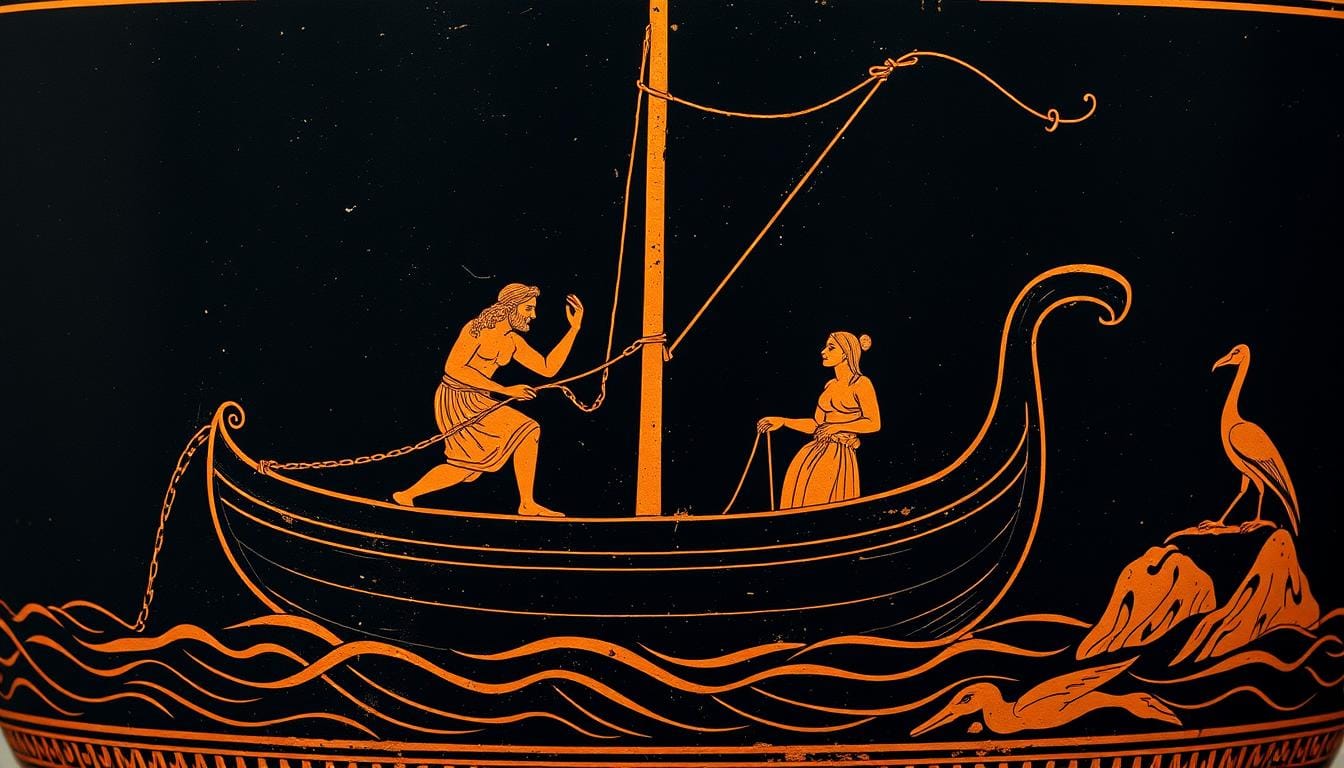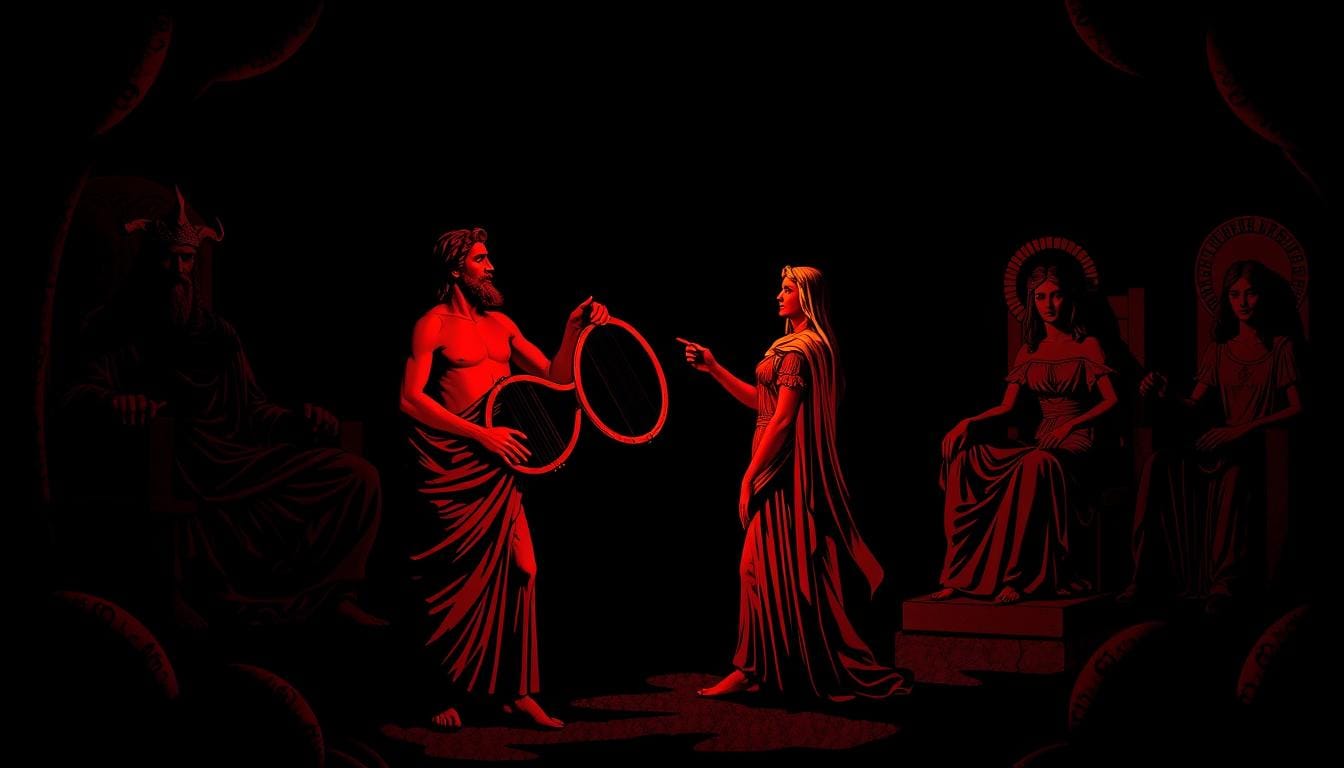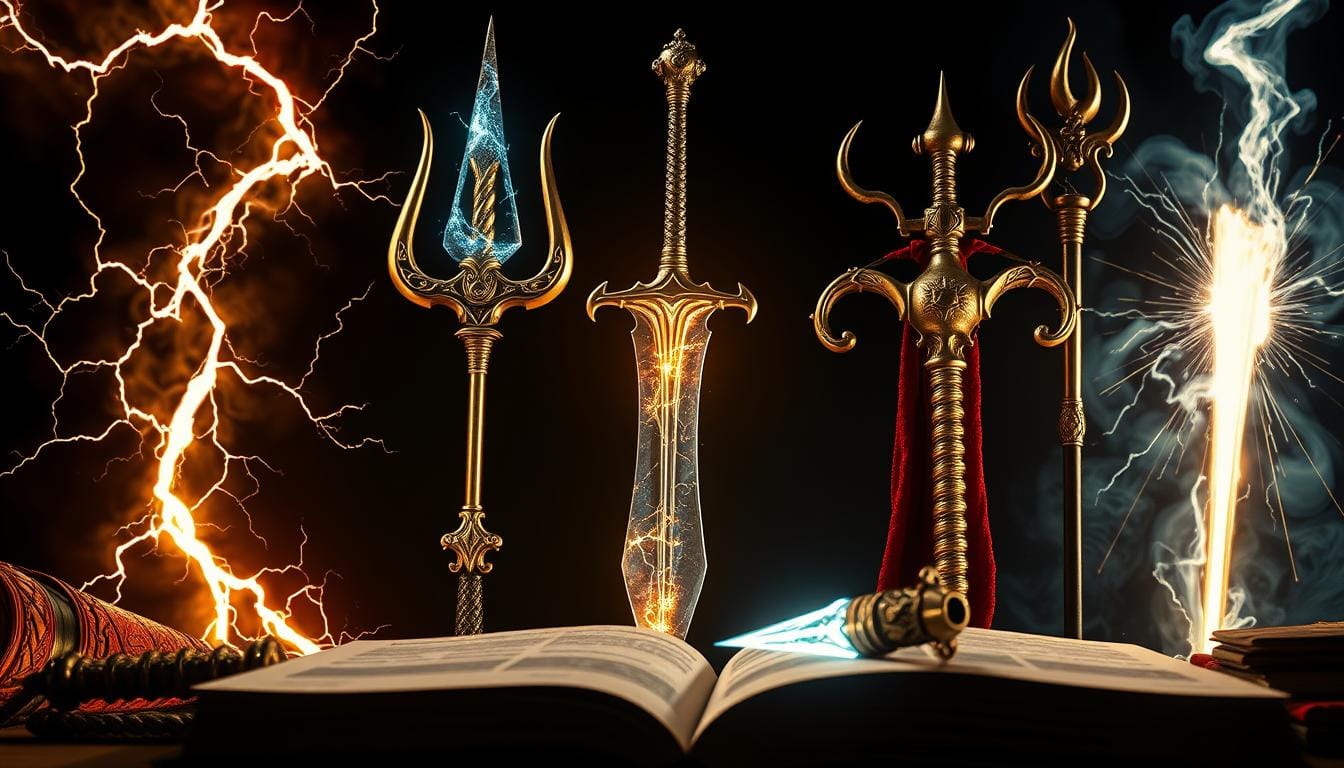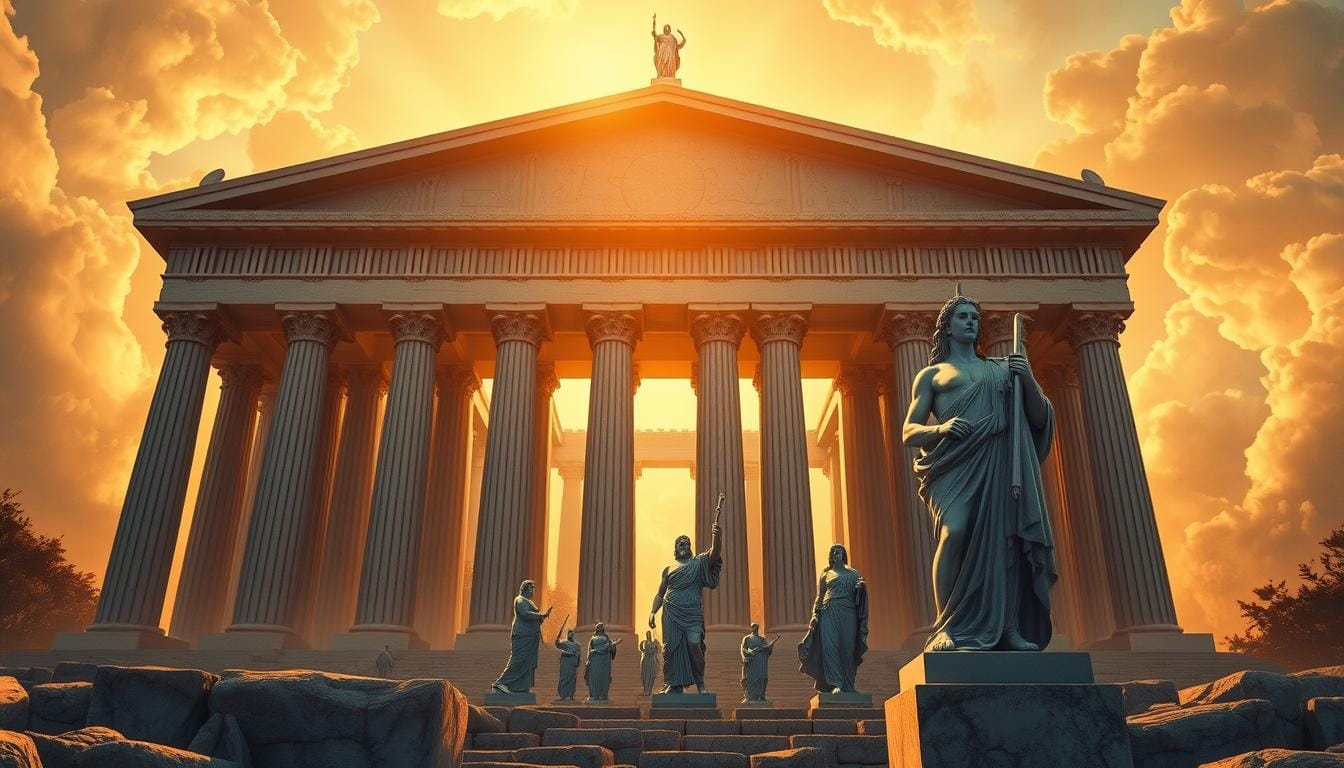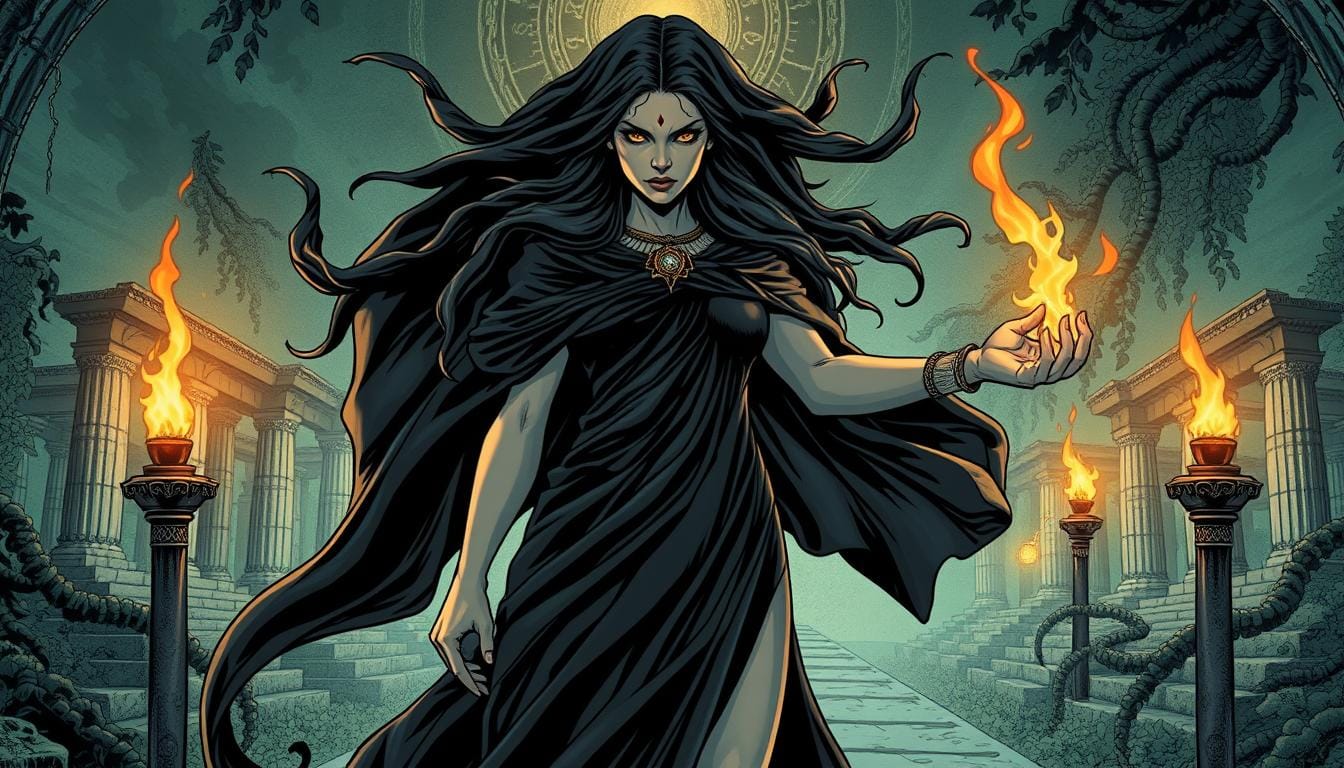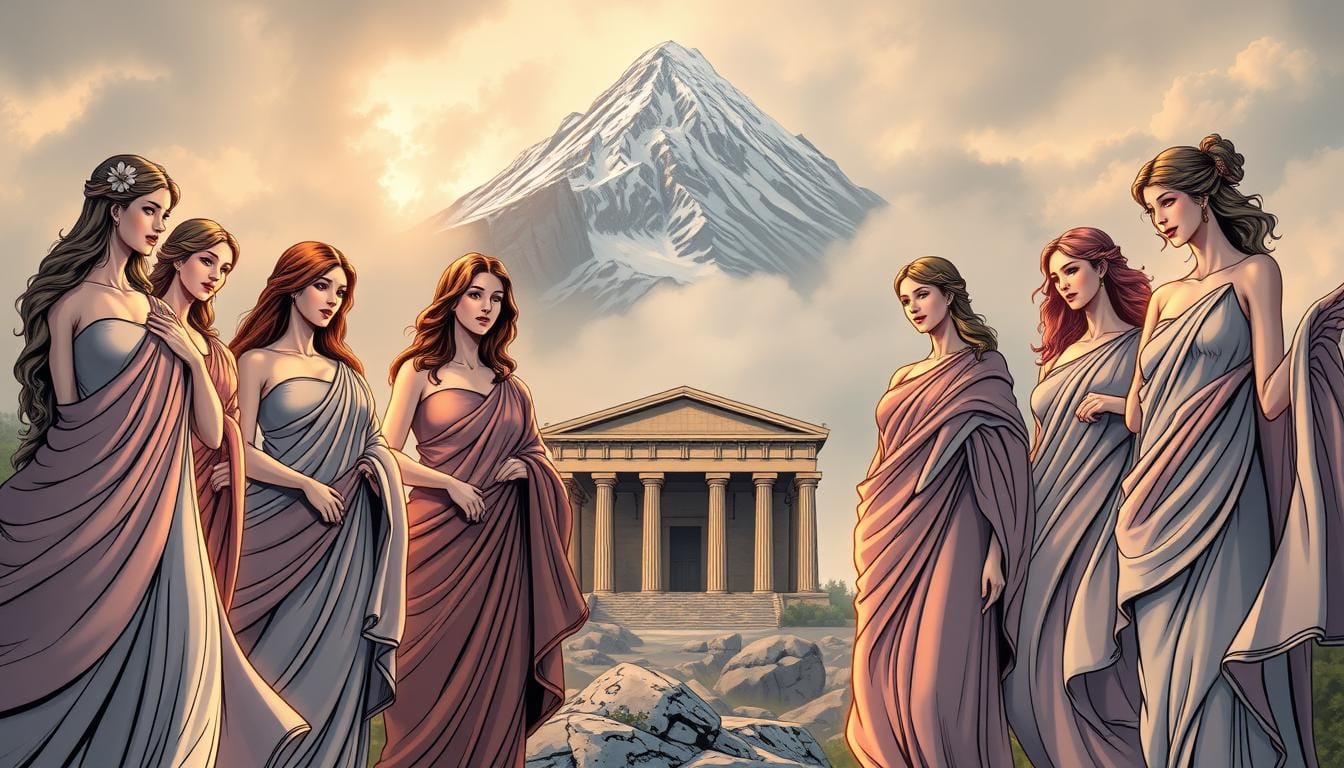In the vast pantheon of Greek mythology, few figures command as much respect and fascination as Achilles The Invincible Warrior. His name has transcended millennia, becoming synonymous with extraordinary strength, battlefield prowess, and paradoxically, fatal vulnerability. The legendary hero of Homer’s Iliad continues to captivate our imagination not just for his superhuman abilities, but for the deeply human complexities that defined his character and sealed his fate.
What made this demigod warrior truly invincible on the battlefield? How did his divine lineage shape his destiny? And what can his tragic story teach us about the eternal themes of mortality, heroism, and human frailty? Join us as we explore the multifaceted legend of Achilles, whose shadow looms large over Western literature and continues to resonate with audiences seeking to understand the delicate balance between strength and vulnerability.
The Birth of a Demigod: Divine Origins of Achilles The Invincible Warrior
Thetis dipping Achilles into the River Styx, granting him near-invulnerability except for his heel
Achilles’ extraordinary story begins even before his birth, with a prophecy that would shape his destiny. Born to the sea nymph Thetis and the mortal king Peleus, Achilles was the product of a divine union that carried both blessing and curse. The marriage of his parents was itself noteworthy – Zeus, who had once desired Thetis, arranged her marriage to a mortal after learning that her son was destined to become greater than his father.
Determined to protect her son from mortality, Thetis took dramatic action. She held the infant Achilles by his heel and submerged him in the magical waters of the River Styx, the boundary between Earth and the Underworld. This ritual granted him near-complete invulnerability – his body became impenetrable to weapons except for the heel by which his mother held him. This single vulnerable spot would later give rise to the term “Achilles’ heel,” symbolizing a fatal weakness despite overall strength.
As a child, Achilles was placed under the tutelage of the wise centaur Chiron, who taught him the arts of war, medicine, music, and hunting. This comprehensive education shaped him into not just a warrior, but a complex figure capable of both terrible violence and profound sensitivity. His divine lineage and supernatural protection set him apart from ordinary mortals, marking him for an extraordinary – if brief – life.
The Unbeatable Warrior of Troy: Combat Prowess and Battlefield Glory
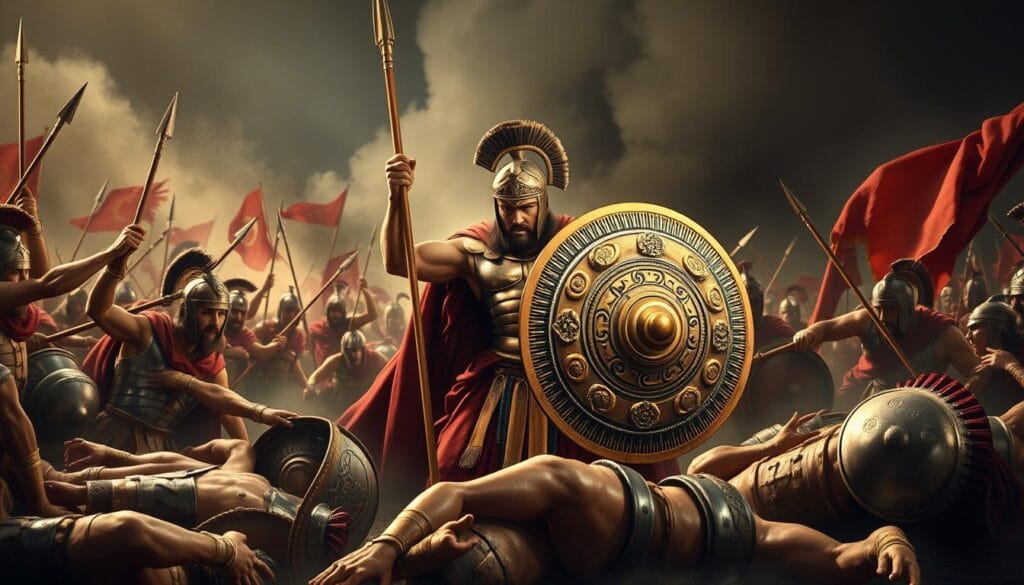
Achilles demonstrating his unmatched combat skills during the Trojan War
When the Trojan War erupted, Achilles emerged as the most formidable warrior in the Greek forces. His combat skills were unparalleled – combining supernatural strength, lightning-fast reflexes, and masterful technique with weapons. Homer describes him as “swift-footed Achilles,” emphasizing his speed and agility that made him nearly impossible to defeat in single combat.
As leader of the Myrmidons, elite warriors from his father’s kingdom, Achilles cut through Trojan forces with terrifying efficiency. His mere presence on the battlefield could turn the tide of battle, striking fear into enemy hearts. The Iliad recounts how Achilles slew countless Trojan warriors, including notable heroes and even Trojan allies like the Amazon queen Penthesilea.
Achilles' Legendary Strengths
- Near-invulnerability from the River Styx ritual
- Divine strength inherited from his goddess mother
- Unmatched speed and agility in combat
- Mastery of multiple weapons and battle tactics
- Natural leadership abilities commanding the Myrmidons
Achilles' Character Traits
- Unyielding pride and sense of honor
- Fierce loyalty to friends and comrades
- Capacity for terrible wrath when provoked
- Surprising sensitivity and artistic abilities
- Acceptance of his fated early death for eternal glory
What made Achilles truly exceptional wasn’t just his physical abilities, but his warrior spirit. He embodied the Greek heroic ideal – choosing a brief but glorious life over a long but unremarkable one. This philosophy drove him to extraordinary feats on the battlefield, securing his place in legend even as it hastened his demise. His armor, crafted by the god Hephaestus, further enhanced his fearsome appearance and capabilities, making him appear almost godlike to those who faced him in battle.
Wrath and Honor: The Internal Conflicts of an Invincible Hero
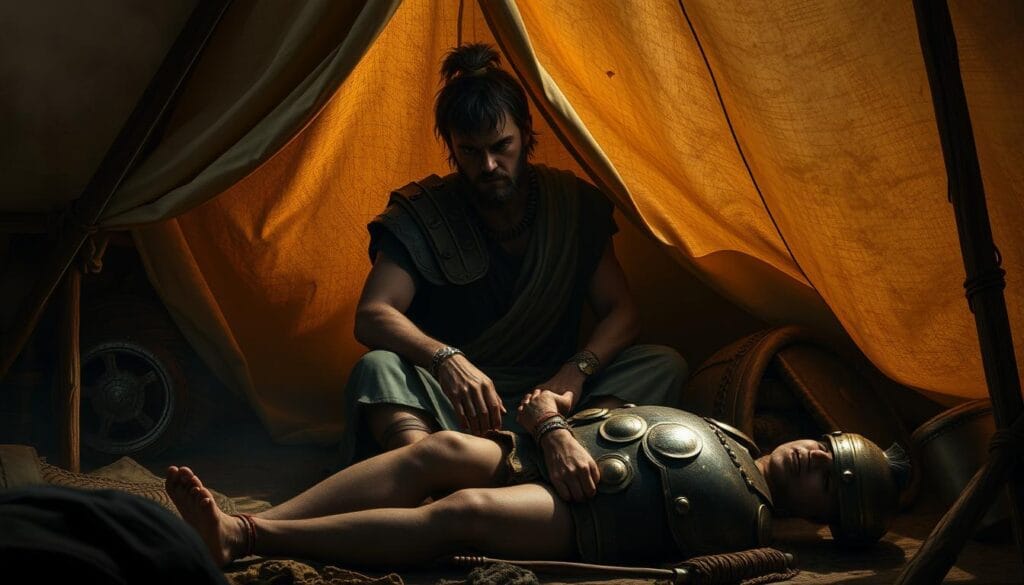
Achilles withdraws from battle after his quarrel with Agamemnon, demonstrating his famous wrath
Despite his physical invincibility, Achilles was vulnerable to powerful emotions that shaped his actions throughout the Trojan War. The opening line of the Iliad – “Sing, O goddess, the anger of Achilles” – establishes his wrath as the central theme of Homer’s epic. This anger erupted when Agamemnon, leader of the Greek forces, took Briseis, a captive woman awarded to Achilles, as compensation for returning his own captive.
This perceived dishonor triggered Achilles’ famous withdrawal from battle. His pride wounded, he refused to fight, even as the Trojans pushed the Greeks back to their ships. This decision revealed the complex nature of Achilles’ character – his sense of personal honor outweighed even his commitment to the Greek cause and his fellow warriors. His mother Thetis convinced Zeus to favor the Trojans during his absence, further demonstrating the far-reaching consequences of his wrath.
This internal conflict between personal honor and collective duty highlights the paradox at the heart of Achilles’ character. Though physically invincible, he remained vulnerable to his own emotions – pride, rage, and later, grief. These human weaknesses in an otherwise superhuman warrior make Achilles a figure of profound tragedy and complexity, embodying the Greek understanding that even the greatest heroes carry fatal flaws within themselves.
Love and Vengeance: Patroclus, Hector, and the Price of Invincibility
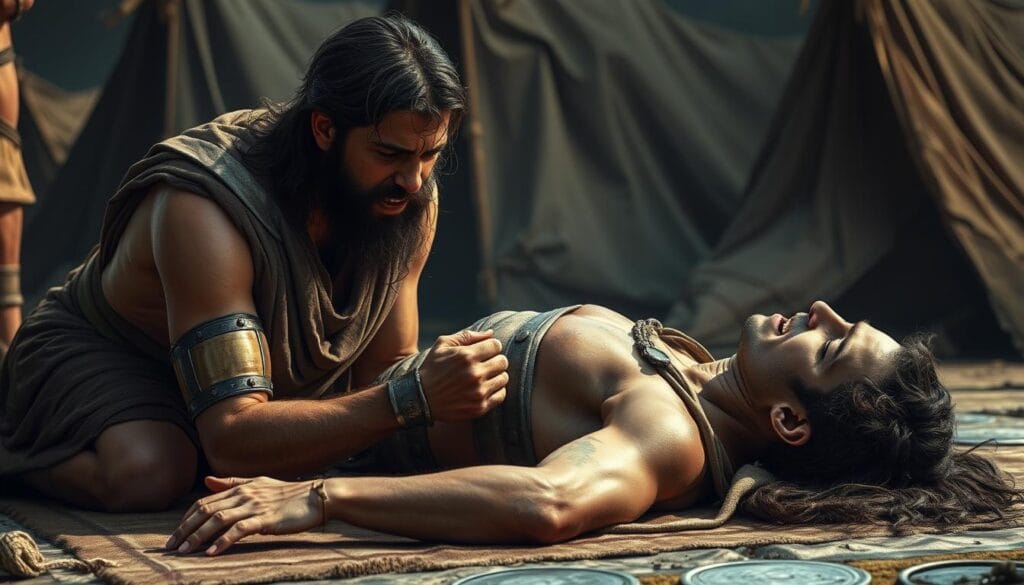
Achilles mourns the death of Patroclus, the catalyst for his return to battle
The turning point in Achilles’ story came with the death of Patroclus, his closest companion. With the Greeks facing defeat during Achilles’ absence, Patroclus convinced Achilles to let him lead the Myrmidons into battle wearing Achilles’ armor. The plan ended in tragedy when Hector, Troy’s greatest warrior, killed Patroclus, believing him to be Achilles.
The relationship between Achilles and Patroclus has been interpreted in many ways throughout history – as close friends, cousins, or lovers. Regardless of interpretation, their bond was profound, and Patroclus’ death transformed Achilles’ wrath into something even more terrible. His grief manifested as an all-consuming desire for vengeance against Hector and the Trojans.
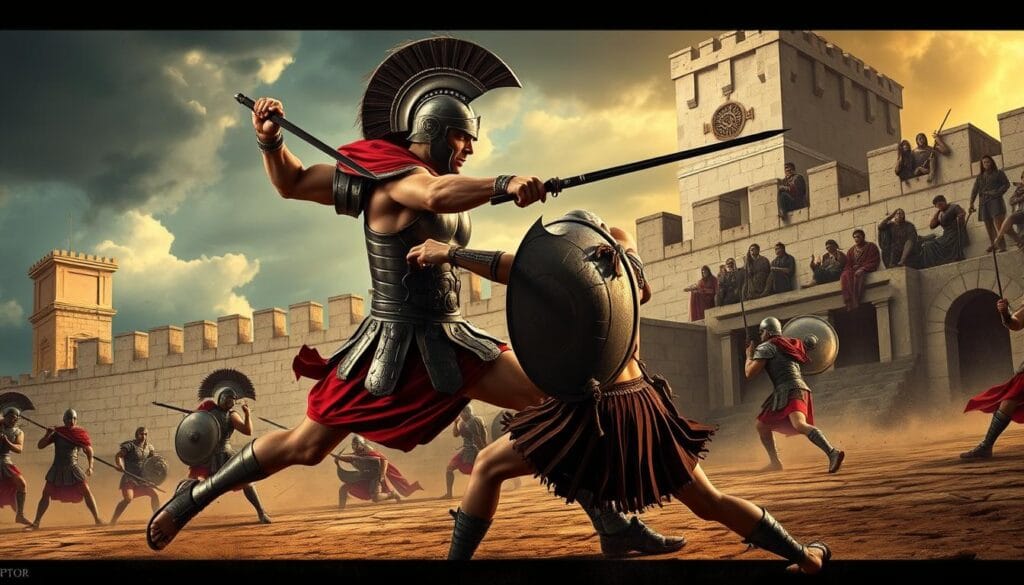
The legendary duel between Achilles and Hector, Prince of Troy
Returning to battle with new armor forged by Hephaestus, Achilles became a force of destruction unlike anything seen before. He slaughtered Trojans with such ferocity that the river god Scamander rose up against him, angered by the bodies clogging his waters. Finally, Achilles confronted Hector in single combat outside the walls of Troy. Despite Hector’s skill, he was no match for the invincible warrior. After killing him, Achilles demonstrated the depths of his rage by dragging Hector’s body behind his chariot around the walls of Troy for twelve days.
This desecration revealed how grief had transformed Achilles. The warrior who once withdrew over a matter of honor now abandoned all honor in his quest for vengeance. Only when Priam, Hector’s elderly father, came to beg for his son’s body did Achilles finally relent, showing a return of his humanity. This moment of compassion amidst overwhelming grief demonstrates the complex emotional journey of a character who, despite his invincibility, remained profoundly human in his capacity for both cruelty and mercy.
The Price of Invincibility: Achilles' Death and Enduring Legacy
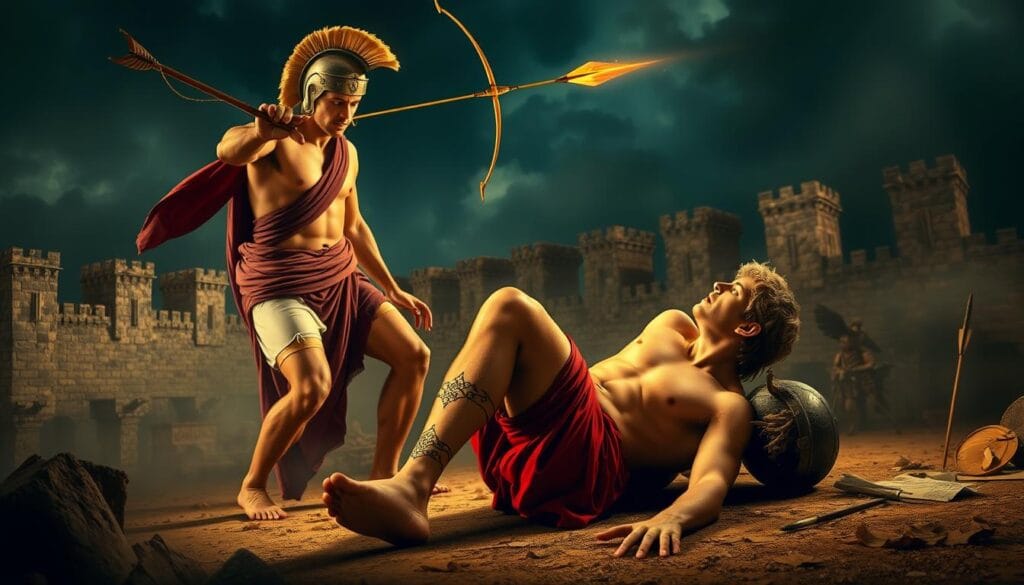
The death of Achilles The Invincible Warrior, struck by Paris’ arrow in his vulnerable heel
Achilles’ story concludes as prophesied – with an early death that secured his eternal fame. Though the Iliad ends before depicting his death, later traditions describe how Paris, guided by the god Apollo, shot an arrow that struck Achilles in his vulnerable heel. This seemingly minor wound proved fatal to the otherwise invincible warrior, fulfilling the prophecy that had haunted him since birth.
The manner of his death carries profound symbolism. The greatest warrior of his age, capable of defeating armies, was ultimately brought down by his one physical vulnerability. This parallels how his emotional vulnerabilities – pride, wrath, and grief – had shaped his fate throughout his life. The concept of the “Achilles’ heel” has transcended its mythological origins to become a universal metaphor for a fatal weakness in an otherwise strong person or system.
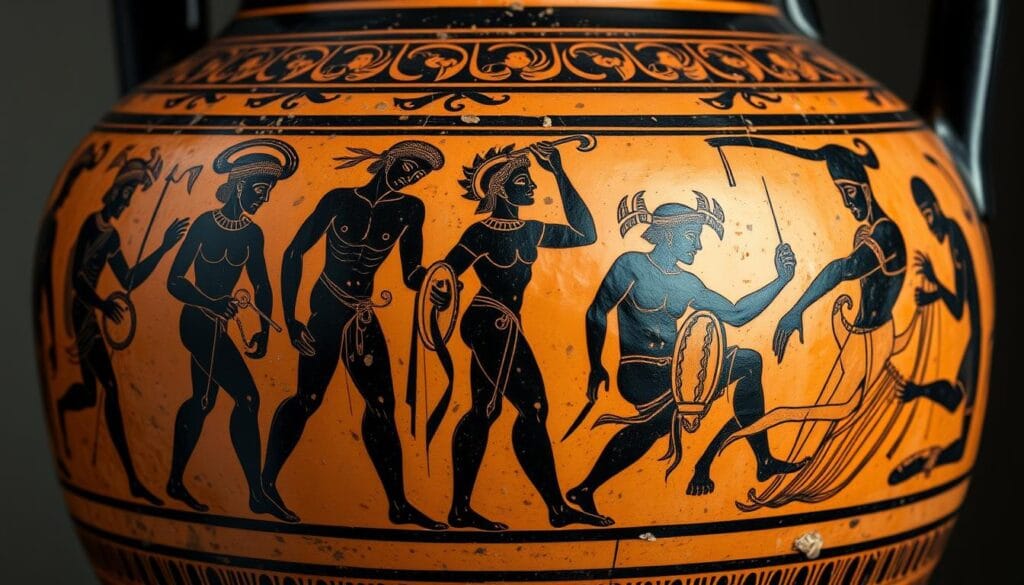
Ancient Greek artwork depicting scenes from the life of Achilles, demonstrating his cultural importance
After his death, a fierce battle erupted over Achilles’ body and armor. Ajax the Greater recovered his body, while his divine armor became the prize in a contest ultimately won by Odysseus. According to some traditions, Achilles was granted immortality after death, either in Elysium or on the White Island in the Black Sea, where he was said to have married Helen or Medea in the afterlife.
The legacy of Achilles The Invincible Warrior extends far beyond Greek mythology. His story has inspired countless works of literature, art, and film throughout history. From ancient Greek tragedies to Renaissance paintings to modern novels like Madeline Miller’s “The Song of Achilles,” his complex character continues to captivate audiences. The enduring fascination with Achilles speaks to the timeless themes his story embodies – the tension between glory and mortality, the destructive power of rage, and the fundamental vulnerability that exists within even the strongest among us.
Achilles in Modern Context: Why The Invincible Warrior Still Matters
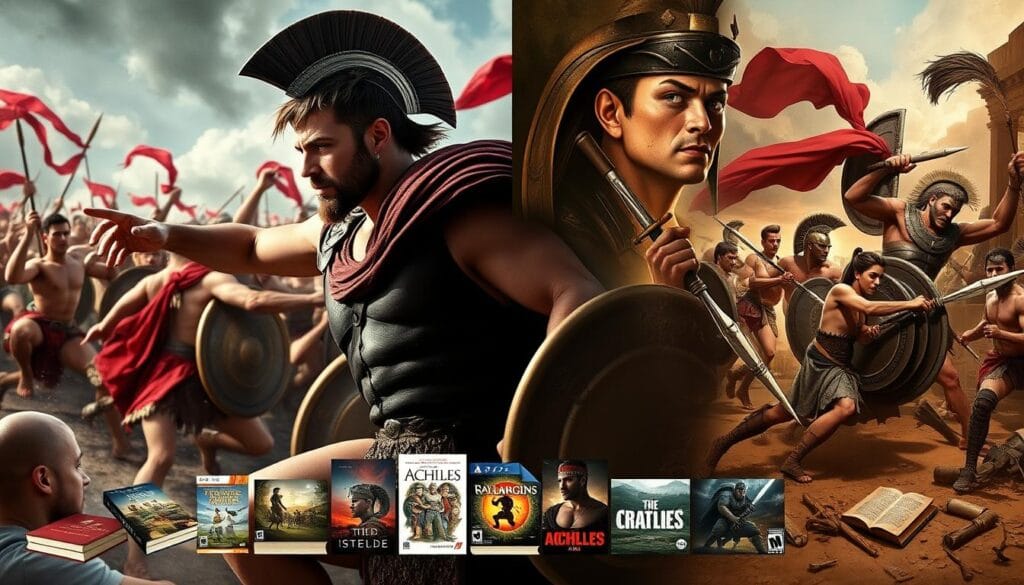
Achilles continues to inspire modern interpretations across literature, film, and art
Despite the millennia that separate us from Ancient Greece, Achilles’ story continues to resonate with contemporary audiences. His character embodies universal themes that transcend time and culture. The concept of choosing a brief but glorious life over a long but unremarkable one speaks to our modern preoccupation with legacy and impact. His struggle with pride and authority challenges us to consider the balance between personal honor and collective responsibility.
Modern psychology finds in Achilles a case study of how trauma and grief can transform a person. His withdrawal after being dishonored by Agamemnon and his devastating response to Patroclus’ death illustrate how emotional wounds can sometimes prove more significant than physical ones. Even in our age of advanced military technology, the idea of a warrior whose prowess seems superhuman but who remains vulnerable to human emotions continues to fascinate.
What does the story of Achilles teach us about human nature?
Achilles’ story reveals the complex duality of human nature – how strength can coexist with vulnerability, how glory often demands sacrifice, and how even the mightiest heroes remain subject to fate and their own emotional weaknesses. His journey from prideful warrior to grief-stricken avenger to compassionate human being (when he returns Hector’s body) demonstrates the full spectrum of human capacity for both destruction and empathy.
Why is Achilles considered the greatest warrior in Greek mythology?
Achilles earns this distinction through his unmatched combat abilities, divine lineage, near-invulnerability, and pivotal role in the Trojan War. Homer’s Iliad portrays him as capable of defeating entire armies single-handedly. Beyond physical prowess, his commitment to heroic ideals and his choice of glory over longevity established him as the archetypal warrior-hero in Western literature.
The enduring appeal of Achilles The Invincible Warrior lies in this paradox – that even the strongest among us harbor weaknesses, that invincibility in one area often comes with vulnerability in another. His story reminds us that true heroism isn’t about being flawless, but about confronting our limitations while striving for excellence. In a world increasingly focused on perfection and success, Achilles offers a more nuanced vision of what it means to be truly human.
Conclusion: The Immortal Legacy of Achilles The Invincible Warrior
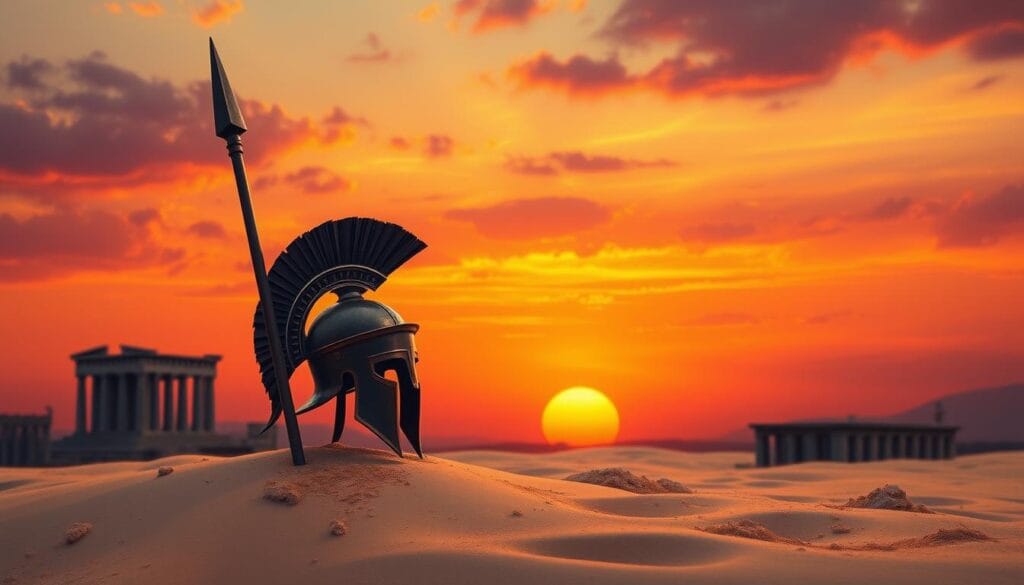
The immortal legacy of Achilles lives on through his legendary story
Achilles The Invincible Warrior stands as one of mythology’s most complex and compelling figures – a study in contrasts that continues to captivate our imagination. His physical invulnerability juxtaposed with his emotional volatility, his pursuit of glory alongside his capacity for compassion, and his acceptance of a predetermined fate while fiercely asserting his agency – these paradoxes make him eternally relevant.
Through Achilles, we confront fundamental questions about the human condition. What price are we willing to pay for greatness? How do we balance individual honor with collective responsibility? Can strength coexist with vulnerability? His story offers no simple answers, but instead invites us to contemplate these tensions that define the human experience across time and culture.
The legend of Achilles reminds us that true immortality comes not from divine intervention or physical invulnerability, but through the stories we leave behind. In choosing a brief but glorious life, Achilles achieved exactly what he sought – eternal remembrance. His name lives on not just as a symbol of martial prowess, but as an enduring exploration of heroism in all its complicated, contradictory glory.
Explore More Greek Heroes and Myths
Delve deeper into the fascinating world of Greek mythology with our comprehensive guide to legendary heroes. Discover the stories of Odysseus, Heracles, Perseus, and more in our illustrated digital collection.
